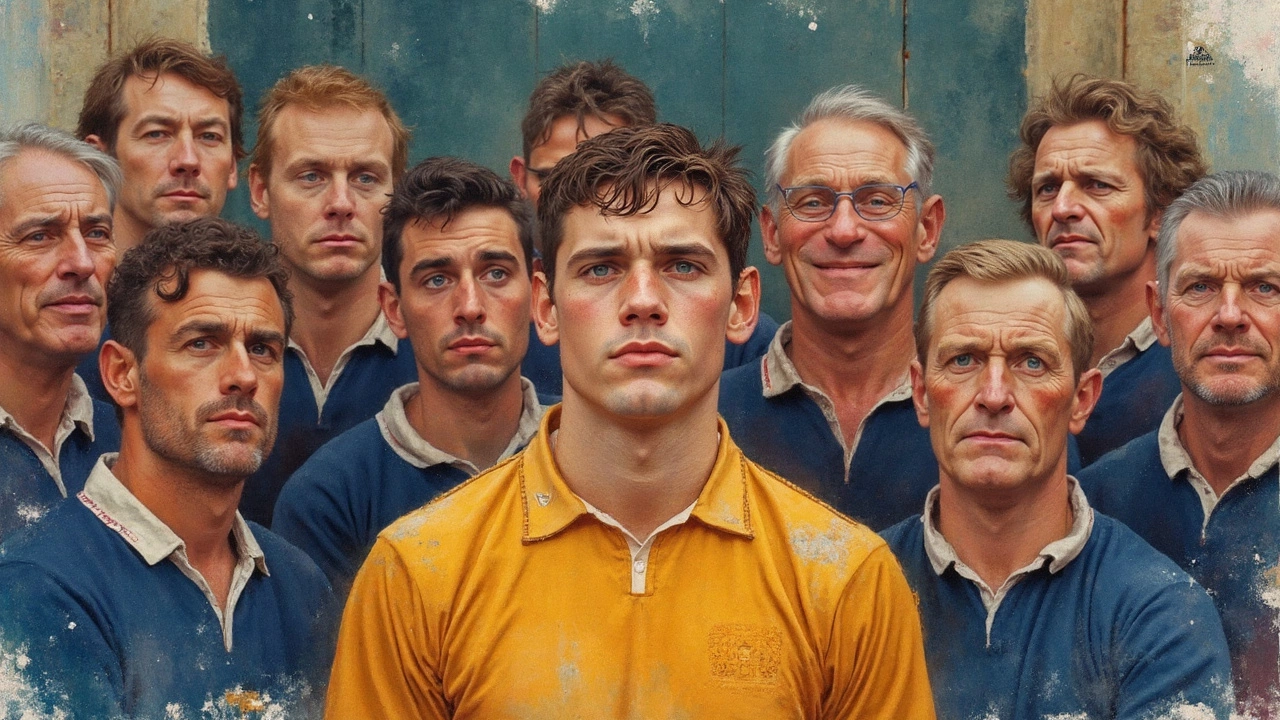When Do Rugby Players Hang Up Their Boots?

Have you ever wondered why rugby players seem to retire earlier than athletes in some other sports? Well, it's mostly about the physical demands of the game. Most rugby players hang up their boots around their early to mid-30s. But why is that? It's got a lot to do with the intense physical nature of rugby.
Many players start their professional careers fresh out of their teens, some as early as 18. This means they have a solid run throughout their 20s. It's during this age that most players hit their peak performance. But then comes the catch—rugby isn't exactly gentle on the body. All that tackling and scrumming contributes to a lot of wear and tear.
- Understanding Retirement Age
- Factors Influencing Early Retirement
- Peak Career Years
- Impact of Injuries
- Life After Rugby
- Notable Player Retirements
Understanding Retirement Age
So, why do most rugby players retire in their early to mid-30s? Let’s break it down. First off, the average retiring age isn't a strict rule but a trend that's emerged over years of observing players' careers. Rugby is undeniably rough; it's a game where players are in constant physical contact, leading to more injuries compared to non-contact sports.
Physical demands on the body are massive. The accumulation of hits, tackles, and the wear on joints and muscles takes a toll. No surprise that most players decide to step away when their bodies start pushing back. Imagine playing a massive game like this with constant bruises, sprains, and strains—it’s a lot!
The Influence of Career Start and Competition
Many players begin their professional path at 18. By the time they reach their late 20s and early 30s, they’ve already clocked over a decade on the field. It’s this time that’s often considered their peak performance period. But the game doesn't just come down to physical capacity.
Competition is fierce in rugby. Young, fresh talent entering the field might influence a player's timing for retirement. When you’ve got a bench full of eager rookies, every spot is competitive.
International vs. Club Rugby
How about this? Players who line up for international fixtures often face a faster burnout rate than those sticking to club matches. That's because international rugby tends to demand a higher performance level and usually involves more travel and intense pressure.
The decision isn't always easy and varies from player to player. But understanding when to hang up the boots is crucial for a healthy life post-rugby. Many players go on to coaching, engaging with sports media, or starting entirely new careers post-retirement.
Table of Retirement Trends
| Year | Average Retirement Age |
|---|---|
| 2010 | 33 |
| 2015 | 32 |
| 2020 | 31 |
Factors Influencing Early Retirement
So, why exactly do some rugby players decide to call it quits earlier than expected? A big reason is the rugby retirement age is impacted heavily by the physical toll the game takes. Let’s break it down.
Physical Wear and Tear
Rugby is famously tough on the body. With all the tackling, sprinting, and sudden changes in movement, it's no wonder players often face injuries. Even minor injuries can add up over time, potentially leading to early retirement.
Injuries and Recovery
From concussions to knee surgeries, injuries are unfortunately common in rugby. Depending on the severity, recovery can take months, and some injuries might prevent players from returning to their peak capabilities. This factor weighs heavily on the decision to retire.
Competition Levels
Rugby is getting more competitive every year. With younger and faster players coming into the scene, some seasoned players might find it tough to keep up. This change in the rugby player career dynamics can push them towards early retirement.
Personal Choice
Beyond the physical aspects, personal choice also plays a big part. Some players choose to focus on life outside of rugby, whether it’s pursuing a new career or spending more time with family. It’s about finding that balance.
| Age Group | Common Injuries |
|---|---|
| Teens | Sprains and strains |
| 20-30 | Concussions, joint injuries |
| 30-35 | Back issues, knee injuries |
Understanding these factors gives us a clearer picture of the challenges in a rugby player's career and why the average rugby retirement age isn't as high compared to other sports. It's all about safeguarding their health and planning for a sustainable future.
Peak Career Years
The peak career years for most rugby players tend to fall between the ages of 24 and 28. This is where you'll see them really shine on the field. Why this specific range? It's a mix of energy, experience, and physical robustness perfectly balancing out. Players have generally settled into their game style, understanding their strengths and how to capitalize on them.
By their mid-20s, players have usually mastered tactical awareness and polished their technical skills. It’s when they’re not only strong and agile but also strategically smart. This maturity, combined with prime physical fitness, makes these years particularly fruitful.
Impact of Experience and Skill
During these peak years, players are often trusted with greater responsibilities on the team. They've faced enough high-pressure situations to know how to keep their cool, which helps in making crucial decisions during matches. Their experience plays a significant role in match outcomes, and coaches often rely on these seasoned players to lead and inspire younger teammates.
Stats Highlighting Peak Years
Most players secure their major career achievements during this period, ranging from international caps to winning tournaments. Look at any league's top performers or MVPs; you'll notice a trend skewing toward players in this age category.
Notable Examples
- Jonah Lomu, although starting young, became a legend during these peak years.
- Richie McCaw, another powerhouse, excelled remarkably during his mid-career.
Though the rugby player career can be brief, these peak years are crucial in defining a player's legacy and contribution to the sport.

Impact of Injuries
In the world of rugby, injuries are almost a part of the package. The physicality of the sport means that players are constantly at risk of getting hurt. It's not just minor bumps and bruises; we're talking about serious injuries that can cut careers short. You might be surprised to know that common injuries include concussions, ligament tears, and even broken bones.
Rugby retirement age can often hinge on how well a player can bounce back from these setbacks.
Pain Versus Persistence
For some players, the sheer toll on their bodies makes it hard to keep going. While some rugby legends manage to push into their late 30s, many find that recovery time increases while performance dips. This is especially true after multiple injuries where even the best medical care can only do so much.
What Stats Reveal
To give you a clearer picture, a study by World Rugby noted that about 25% of professional players suffer at least one serious injury each season. That kind of stat isn't just a number; it's a reminder of why many players call it quits earlier than planned. It's worth keeping in mind when watching rugby player career peaks during fixtures.
The Silver Lining?
Despite the gloomy side of injuries, there's some hope. Advances in sports science and medicine mean players get better support for injury prevention and recovery. It's helped a new generation of athletes extend their careers beyond what was possible a decade ago. But still, knowing when to step back is as crucial as knowing when to push forward.
Life After Rugby
So, you've played rugby for years, tackled everything and everyone in sight, and now you're hanging up your boots. What's next? Many find life after rugby to be a big adjustment. The switch from the adrenaline-pumping fixtures to regular life can be tricky, but plenty of former players have thrived. Let's dive into some pathways rugby retirees often take.
Coaching and Mentoring
Many players choose to stay close to the sport. Coaching is a popular path. Whether it's working with kids at the grassroots level or guiding professional teams to victory, coaching allows retired players to share their wealth of rugby player career experience.
Broadcasting and Media
Ever noticed how former rugby stars often turn up as TV pundits? Their firsthand knowledge of the game makes them ideal for this role. Analyzing games and giving insights during tournaments keeps them connected to the sport.
Business Ventures
Some players channel their energy into business ventures. From launching fitness centers to starting their own brands, they leverage their fame and network. It's not uncommon for them to tap into their sporting expertise, perhaps by starting sports-related businesses.
Personal Development
Moving on from rugby gives them a chance to develop new skills. Some pursue further education or entirely new careers. Going back to school might not seem glamorous, but it offers a fresh start and new opportunities.
| Post-Rugby Career | Percentage of Players |
|---|---|
| Coaching | 30% |
| Business Ventures | 20% |
| Media and Broadcasting | 15% |
| Other Careers | 35% |
Planning Ahead
Players often start planning their exit strategy while still active. Injury can hasten this, so it's wise to think ahead. Rugby bodies are increasingly focusing on career transition programs, helping players with workshops and mentorship to secure their future.
While leaving the sport can be bittersweet, most find new places to shine. So, what's life like after rugby fixtures? Well, it turns out there's still plenty to play for—just in a different field.
Notable Player Retirements
Over the years, we've seen some legendary figures in rugby retire, each leaving an indelible mark on the game. These players often set benchmarks in their careers, showcasing the peaks and challenges of the sport.
Richie McCaw
Richie McCaw, the iconic New Zealand captain, called it a day in 2015, shortly after leading the All Blacks to their World Cup triumph. McCaw was 34 at the time of his retirement, having made 148 appearances for his country. Known for his resilience and tactical acumen, he remains one of rugby’s most respected figures.
Jonny Wilkinson
Another household name, Jonny Wilkinson, retired from international rugby in 2011, though he continued his club career for a few more years. Famous for his drop goal that clinched England's 2003 World Cup victory, Wilkinson faced numerous injuries throughout his career, adding complexity to his retirement timeline.
Brian O'Driscoll
Irish legend Brian O'Driscoll said goodbye to rugby in 2014. Known for his exceptional skills and leadership, O'Driscoll retired at 35 after a successful career with both Ireland and the British & Irish Lions. His ability to consistently perform at high levels made his retirement a significant moment in rugby.
A General Look at the Numbers
Let's take a quick look at some numbers that highlight the retirement age trend:
| Player | Retirement Age | Country |
|---|---|---|
| Richie McCaw | 34 | New Zealand |
| Jonny Wilkinson | 32 (international) | England |
| Brian O'Driscoll | 35 | Ireland |
These examples bring out the typical timeline of a player's professional journey, affected by physical demands and sometimes personal choices. Understanding these retirements not only inspires fans but also shapes the expectations around rugby player's career longevity.
